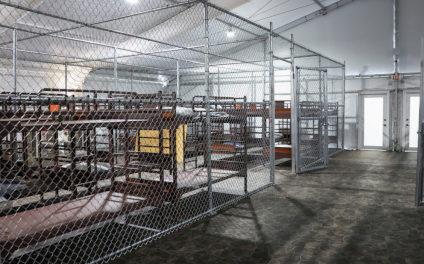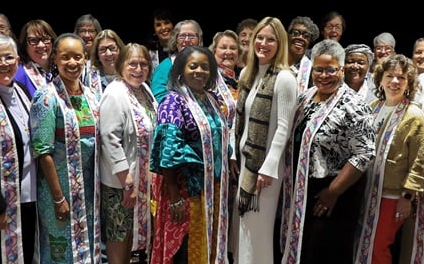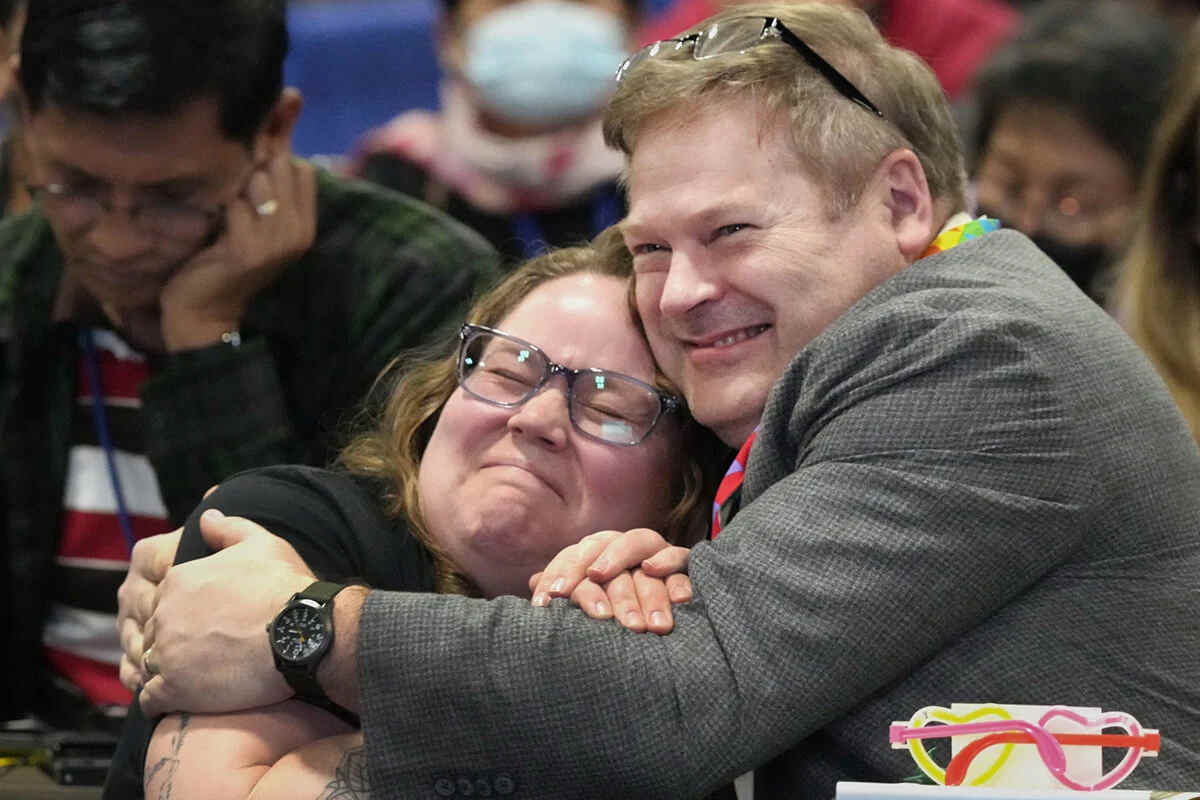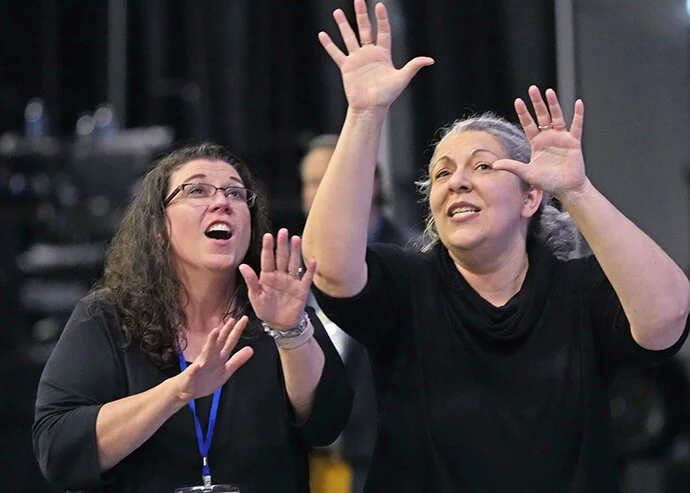The following is an email from Bishop Tom Berlin to us and for the media concerning the alarming events surrounding the detention center here in Florida. I share the sentiments and intense concern as it weighs on my heart, that our sisters and brothers in Christ are suffering due to discrimination and racism in our country. This is not good for our community, country, government, and our church.
I was a stranger, and you welcomed me. Matthew 25:35 CEB
Proposed in June, this week, the first undocumented persons arrived at the makeshift Florida detention center, pejoratively referred to as ‘Alligator Alcatraz.’ Built in just over a week with no public or environmental approval process, the facility is located on a 30-square-mile area and will have an initial capacity of approximately 3,000 people that is expected to increase. It was built despite pushback from many Florida residents. The facility, equipped with cameras, barbed wire, and staff, is situated at the former Dade-Collier Training and Transition Airport, located within Big Cypress National Preserve in Ochopee, Florida. State officials seized the county-owned land, which is prone to flooding and a significant risk of mosquito-borne disease. The hastily assembled facility reflects a partnership between the state of Florida and the federal Department of Homeland Security (DHS) and Immigration and Customs Enforcement (ICE). Florida state funds were used to erect and operate the facility along with funds from the Federal Emergency Management Agency’s (FEMA) Shelter and Services Program.
Supporters of this facility have shared that it was created to relieve pressure on federal detention facilities. They describe the creation of this facility as a Florida ‘state of emergency’ measure. Its purpose is to provide a location from which to interrogate and detain undocumented persons for potential deportation. The high cost, as well as the speed with which this site was developed, is both alarming and a significant concern. It raises the question of values, priorities, and what constitutes a state of emergency. Many Floridians will soon face their own emergencies because of federal budget cuts to healthcare benefits through Medicaid. They will also face an emergency need for food and nutritional support with reductions to the Supplemental Nutritional Assistance Program (SNAP). While these programs that assist families, people with disabilities and the elderly are being dramatically reduced, this new detention center, which reportedly will cost Florida taxpayers $450 million per year,was made a priority.
Environmental groups, human rights advocates, and Native American tribes are also opposed to the facility, expressing concerns about the Florida Everglades ecosystem, citing the harsh environment for humans, and its location on sacred tribal lands.
Leaders and members of The Florida Conference of The United Methodist Church do not support this facility in purpose, design, funding, or location. We do support a clear path to the process for legal immigration and a reduction in criminal activity. When immigration policy is driven by monthly quotas and rapid deportation, officials do not have time to locate criminals. To meet their goals, they must deport persons who have lived in the United States for many years, people who own stores, work in Florida agriculture, clean hotel rooms or work in restaurants in our hospitality industry and live as peaceful neighbors.
We stand in solidarity with those who advocate for humane treatment and compassionate care for all people, including Friends of the Everglades (founded by Marjorie Stoneman Douglas), the Center for Biodiversity, and the Miccosukee Tribe of Indians. Environments that are detrimental to health and pose life-threatening danger are non-compliant with our Scripture, “Continue to remember those in prison as if you were together with them in prison, and those who are mistreated as if you yourselves were suffering.” (Hebrews 13:3 NRSVUE).
In this season, we call on United Methodists to be guided by Scripture as they contact state and federal officials with their concerns, with an eye towards the example and action of the prophet in Nehemiah 5:1-13, as we support peaceful, non-violent protests related to the facility. We encourage people to contact their lawmakers to request the inclusion of provisions that allow for facility inspections and proper environmental reviews, while insisting on the protection of all persons, documented or undocumented, and transparency in the development and use of state land, facilities, and funds.
In Christ,
Bishop Tom Berlin
Resident Bishop
Rev. Dr. Sharon G. Austin
East Central District Superintendent
FLUMC Director of Justice Ministries
Rev. Sherlain Stevens, Senior Pastor,
Ebenezer United Methodist Church, Miami
FLUMC Prison and Jail Ministry
Rev. Beth Bostrom, Senior Pastor,
First United Methodist Church, Palmetto
FLUMC Peace With Justice Coordinator
Content Resources
Anderson, Curt; Payne, Kate Payne (contributor) July 3, 2025. “First immigration detainees arrive at ‘Alligator Alcatraz’ in Florida Everglades” https://www.pbs.org/newshour/nation/first-immigration-detainees-arrive-at-alligator-alcatraz-in-florida-everglades. PBS. Retrieved July 5, 2025.
Alligator Alcatraz – Wikipedia. Retrieved from https://en.wikipedia.org/w/index.php?title=Alligator_Alcatraz&oldid=1298731961, July 5, 2025.
Aleaziz, Hamed. June 23, 2025. Updated July 1, 2025. Retrieved July 5, 2025.
https://www.nytimes.com/2025/06/23/us/politics/florida-alligator-alcatraz-migrant-detention-center.html?unlocked_article_code=1.Uk8.dsqn.fy7C8AuB8x-j&smid=em-share
Flagg, Anna. March 30, 2018. Retrieved July 5, 2025.
https://nyti.ms/2w2nRss. uhttps://www.nytimes.com/interactive/2018/03/30/upshot/crime-immigration-myth.html
Flagg, Anna. https://www.themarshallproject.org/2019/05/13/is-there-a-connection-between-undocumented-immigrants-and-crime?utm_campaign=share-tools&utm_content=post-top&utm_medium=email&utm_source=email. Retrieved July 5, 2025.
Garsd, Jasmine. https://www.npr.org/2024/03/08/1237103158/immigrants-are-less-likely-to-commit-crimes-than-us-born-americans-studies-find/ . Retrieved July 5, 2025.
FPI Staff. https://www.floridapolicy.org/posts/more-than-1-6-billion-in-snap-cuts-to-florida-would-put-residents-and-state-budget-at-risk-in-2028 Retrieved July 5, 2025.
Ku, Leighton, Kwon Kristine Namhee, Krips, Maddie, Gorak, Taylor, Cordes, Joseph J. https://www.commonwealthfund.org/publications/issue-briefs/2025/jun/how-medicaid-snap-cutbacks-one-big-beautiful-bill-trigger-job-losses-states Retrieved July 5, 2025.










